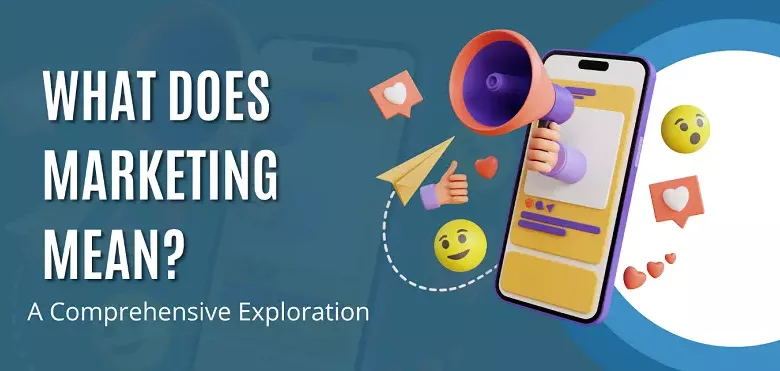What Does Marketing Mean? A Comprehensive Exploration

“What does marketing mean?” is a question that encapsulates the essence of how businesses connect with their audience in the modern world.
Marketing is a multifaceted concept that goes beyond mere promotion; it encompasses the strategies and techniques used to understand, attract, and engage customers.
In this in-depth exploration of the meaning of marketing, we’ll delve deep into its core principles and significance in today’s digital age while also touching upon the role of social media marketing (SMM) panels.
The Foundations of Marketing
At its core, marketing is the art and science of promoting and selling products or services. However, it’s essential to recognize that marketing extends far beyond these fundamental objectives.
It involves a complex blend of strategies, research, and communication methods to create value for both businesses and consumers.
Understanding Customer Needs
One of the foundational principles of marketing is understanding customer needs and preferences. Effective marketing begins with comprehensive market research to identify target audiences, their desires, pain points, and behaviors.
This understanding forms the basis for creating products and services that resonate with consumers.
Marketing professionals use various tools and techniques to gather and analyze data, such as surveys, focus groups, and customer feedback.
In the digital age, data-driven insights play a pivotal role in shaping marketing strategies, allowing businesses to tailor their offerings to precisely meet customer demands.
Creating Value Propositions
Marketing is not just about selling; it’s about creating value. Businesses must craft compelling value propositions that resonate with their target audience.
A value proposition communicates the unique benefits of a product or service, addressing the “What’s in it for me?” question that consumers often ask.
Effective marketing messages highlight how a product or service can solve a problem or enhance the customer’s life.
These messages should be clear, persuasive, and tailored to the specific needs and aspirations of the target market.
Building Brand Identity
Brand identity is a cornerstone of marketing. It encompasses the visual elements, messaging, and overall perception associated with a brand. A strong brand identity fosters trust, loyalty, and recognition among consumers.
Communication and Promotion
Marketing involves creating and executing strategies to communicate with the target audience effectively. This includes advertising, public relations, content marketing, and more.
The choice of communication channels depends on the nature of the product or service and the target audience’s preferences.
In today’s digital age, online marketing has become increasingly prominent. Social media platforms, search engines, email marketing, and other digital channels offer diverse opportunities to connect with potential customers.
Delivering Customer Satisfaction
Ultimately, marketing is not just about acquiring customers but also about retaining them. Customer satisfaction is a critical aspect of marketing success.
Businesses must consistently meet or exceed customer expectations to build loyalty and foster positive word-of-mouth.
Read Also: Website Marketing Essentials for Businesses
Marketing Strategies in the Digital Age
In the digital age, marketing has undergone a profound transformation. The internet and technology have introduced new avenues for reaching and engaging audiences. Here are some key aspects of modern marketing strategies:
Search Engine Marketing
Having a strong online presence is essential for businesses today. This includes having a user-friendly website optimized for search engines (SEO).
Search engine optimization ensures that your website ranks well in search engine results when potential customers search for relevant keywords.
Content Marketing
Content marketing involves creating and sharing valuable content to attract and engage a target audience.
This content can take various forms, including blog posts, articles, videos, infographics, podcasts, and more. Content marketing establishes authority, educates customers, and builds trust.
Social Media Marketing (SMM)
Social media platforms have become powerful marketing channels. They allow businesses to connect with their audience in real-time, share content, and build communities. SMM Panel assist in increasing social media engagement quickly, but it’s important to integrate panel usage into a broader digital marketing strategy.
Email Marketing
In the digital landscape, email marketing continues to be a potent tool for nurturing leads and sustaining meaningful customer relationships.
This strategy revolves around the process of crafting and dispatching tailored emails to a subscriber base, offering them valuable updates, promotions, and content that align with their preferences.
Personalization and segmentation stand as pivotal elements in the realm of prosperous email marketing endeavors.
Paid Advertising
Paid advertising on platforms like Google Ads, Facebook Ads, Instagram Ads, and others allows businesses to reach a wider audience.
Pay-per-click (PPC) campaigns and display advertising can be highly effective when executed correctly. Remarketing and retargeting strategies also play a crucial role in converting potential customers.
Data Analytics and Personalization
Data analytics have become an integral part of modern marketing. Businesses use data to gain insights into customer behavior, track the performance of marketing campaigns, and make data-driven decisions.
Personalization, based on this data, allows businesses to deliver highly tailored content and offers to individual customers.
Influencer Marketing
Influencer marketing involves collaborating with individuals who have a substantial following on social media platforms.
These influencers promote products or services to their engaged audience, providing an authentic and relatable way to connect with potential customers.
Micro-influencers, those with smaller but highly engaged followings, have also become increasingly popular for more niche marketing efforts.
Read Also: Ways to Encrypt or Password-Protect a PDF
Conclusion
In summary, marketing encompasses a wide array of strategies and techniques aimed at understanding, attracting, and engaging customers.
It involves understanding customer needs, creating value propositions, building brand identity, effective communication, and delivering customer satisfaction.
In the digital age, marketing has evolved to incorporate online presence, content marketing, social media marketing (including the use of SMM Panels), email marketing, paid advertising, data analytics, personalization, and influencer marketing.
The integration of these strategies, along with a deep understanding of customer behavior, is crucial for businesses aiming to thrive in today’s competitive marketplace.
Marketing isn’t just about selling products or services; it’s about building relationships and delivering value to customers.
As we continue to navigate the ever-evolving landscape of marketing, staying adaptable and innovative remains paramount.
The essence of marketing lies in its ability to connect businesses with their audience, and in this digital age, that connection is more vital than ever.





